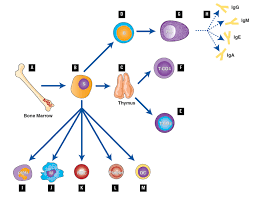The immune system is a marvel of biological engineering, intricately designed to protect our bodies from a myriad of pathogens. It’s not just a defense mechanism but a sophisticated network that interacts with various body systems to maintain health. Understanding how it works can be both fascinating and enlightening. In this article, we explore some mind-blowing health facts about the immune system that highlight its complexity and crucial role in our well-being.
1. The Immune System Is Vast and Complex

1.1 The Immune System’s Components
The immune system is not confined to a single organ but is a network comprising various components, including white blood cells, antibodies, the spleen, lymph nodes, and bone marrow. Each part has a specific function:
- White Blood Cells (Leukocytes): These are the body’s primary defense cells. They include lymphocytes (T-cells and B-cells), phagocytes (such as macrophages and neutrophils), and other cell types involved in immune responses.
- Antibodies: These proteins are produced by B-cells to neutralize or mark pathogens for destruction.
- Spleen and Lymph Nodes: These organs filter pathogens from the blood and lymph, respectively, and facilitate interactions between immune cells.
1.2 The Immune System’s Functions
The immune system performs several key functions:
- Detection and Response: Identifies and responds to pathogens like bacteria, viruses, and fungi.
- Memory Formation: Remembers pathogens it has encountered before, allowing for a quicker response upon re-exposure.
- Self vs. Non-Self Recognition: Distinguishes between the body’s own cells and foreign invaders, preventing autoimmune reactions.
2. The Immune System’s Memory is Remarkable
2.1 How Immunological Memory Works
One of the most remarkable features of the immune system is its ability to remember pathogens. This process, known as immunological memory, involves the creation of memory cells. When the immune system encounters a pathogen for the first time, it mounts a response and creates memory cells that recognize that specific pathogen. If the pathogen is encountered again, these memory cells facilitate a faster and more effective response.
2.2 Vaccination and Immunological Memory
Vaccines exploit this memory mechanism. They expose the immune system to a harmless part of a pathogen (such as a protein or a dead virus), prompting the creation of memory cells without causing disease. This allows the immune system to respond swiftly if it encounters the actual pathogen in the future.
3. The Gut Microbiome Plays a Crucial Role
3.1 The Connection Between Gut Health and Immunity
The gut microbiome, which consists of trillions of microorganisms residing in the digestive tract, plays a pivotal role in immune system function. These microbes help train the immune system, influence its response to pathogens, and maintain the integrity of the gut lining.
3.2 Impact of Diet and Antibiotics
Diet and antibiotics can significantly affect the gut microbiome. A diet rich in fiber and fermented foods supports a healthy microbiome, while excessive antibiotic use can disrupt microbial balance. Maintaining gut health is crucial for overall immune function.
4. The Immune System and Mental Health

4.1 The Gut-Brain-Axis
Recent research has unveiled a connection between the immune system and mental health through the gut-brain axis. This bidirectional communication pathway involves the interaction between the gut microbiome, the immune system, and the brain. Stress and mental health conditions can influence immune responses, and vice versa.
4.2 Chronic Inflammation and Mental Health
Chronic inflammation, often driven by immune system dysregulation, has been linked to mental health conditions such as depression and anxiety. Understanding this connection highlights the importance of managing stress and inflammation for overall mental and physical health.
5. The Immune System Can Be Too Effective
5.1 Autoimmune Diseases
While the immune system is designed to protect the body, it can sometimes attack its own tissues, leading to autoimmune diseases. Conditions like rheumatoid arthritis, lupus, and multiple sclerosis occur when the immune system mistakenly targets healthy cells as if they were foreign invaders.
5.2 Allergies
Allergies are another example of an overactive immune response. In this case, the immune system reacts to harmless substances (allergens) like pollen, pet dander, or certain foods, leading to symptoms ranging from mild (sneezing) to severe (anaphylaxis).
6. The Role of Sleep and Exercise
6.1 Sleep and Immune Function
Quality sleep is essential for a well-functioning immune system. During sleep, the body produces cytokines, proteins that help regulate immune responses. Lack of sleep can impair immune function, making individuals more susceptible to infections.
6.2 Exercise and Immunity
Regular moderate exercise is beneficial for the immune system. It enhances circulation, helps remove toxins, and supports the production of immune cells. However, excessive intense exercise without adequate recovery can have the opposite effect and suppress immune function.
7. The Immune System’s Response to Stress
7.1 Acute vs. Chronic Stress
The immune system’s response to stress is complex. Acute stress can enhance immune responses, providing a temporary boost in readiness to fight infections. However, chronic stress can lead to prolonged immune suppression, increasing vulnerability to diseases and slowing down the healing process.
7.2 Managing Stress for Optimal Immune Function
Effective stress management techniques, such as mindfulness, exercise, and social support, are crucial for maintaining a balanced immune response and overall health.
8. Emerging Research and Future Directions

8.1 Advances in Immunotherapy
Recent advancements in immunotherapy have revolutionized the treatment of various cancers and autoimmune diseases. By harnessing and enhancing the immune system’s ability to target and destroy cancer cells or modulate autoimmune responses, these therapies offer new hope for patients with previously untreatable conditions.
8.2 Personalized Medicine
The future of immune system research lies in personalized medicine. Understanding individual genetic, environmental, and lifestyle factors can lead to more tailored approaches to boosting immunity and treating immune-related diseases.
Conclusion
The immune system is a remarkable and intricate network that plays a crucial role in protecting our health and maintaining balance within our bodies. From its vast and complex components to its remarkable memory and connection with mental health, understanding the immune system offers valuable insights into overall well-being. As research continues to uncover new aspects of immune function and its interactions with other body systems, we gain a deeper appreciation for this vital defense mechanism and its impact on our lives.

